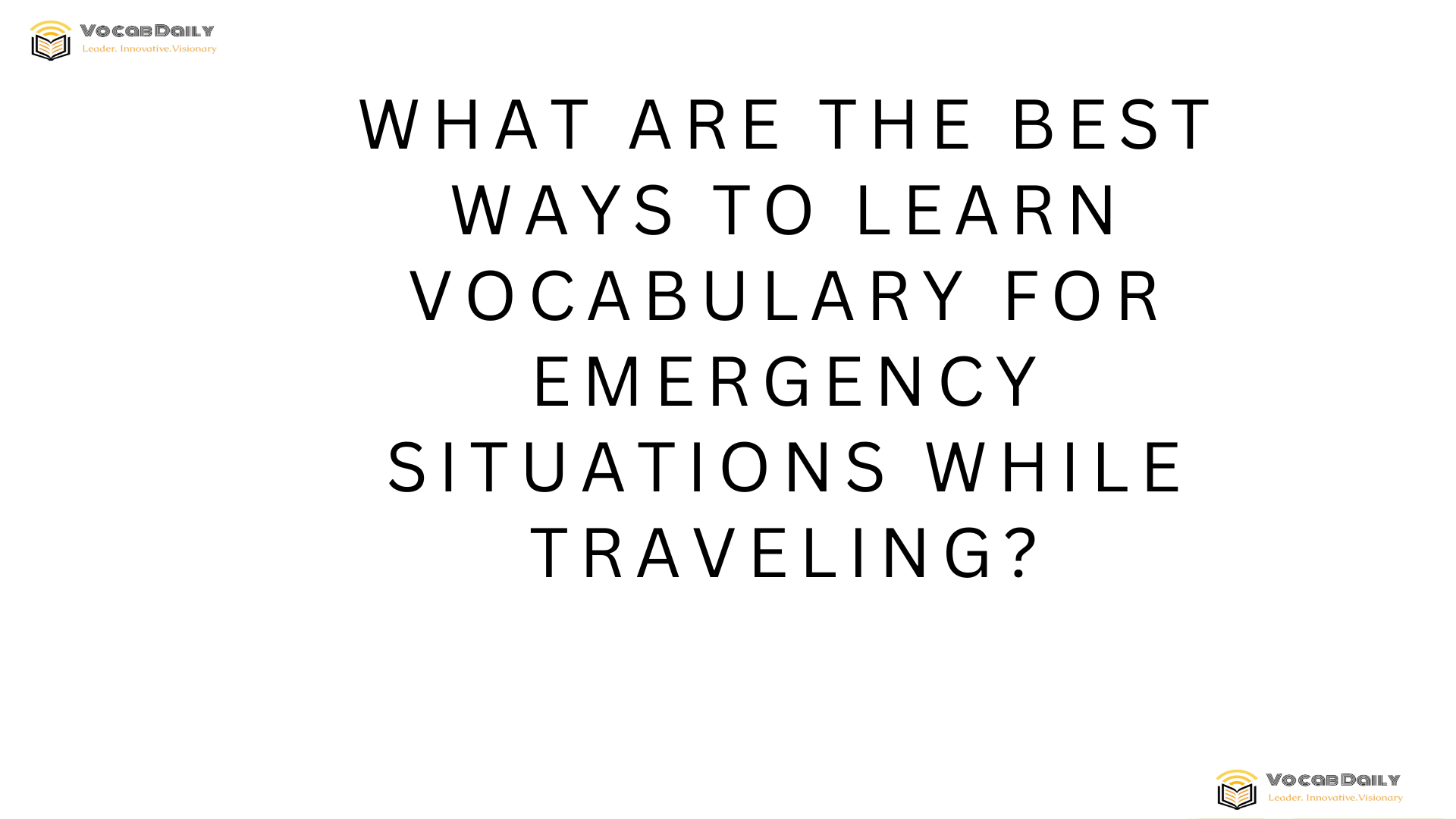What are the best ways to learn vocabulary for emergency situations while traveling
Understand the Importance of Emergency Vocabulary
When traveling to a foreign country, knowing essential emergency vocabulary can be a lifesaver. Emergencies might include medical situations, accidents, or natural disasters where clear communication is crucial. Without the proper words and phrases, travelers risk confusion and delays in receiving help. By preparing ahead, you enhance your safety and confidence while exploring new places.
Focus on High-Impact Vocabulary First
Start by learning words and phrases that are most relevant to emergencies. Examples include terms related to health (doctor, hospital, pain), safety (danger, help, police), and common emergency actions (call, stop, fire). Prioritizing these high-impact words ensures you can effectively communicate urgent needs without having to memorize an overwhelming list of vocabulary.
Use Language Apps Designed for Travelers
Many language learning apps include emergency vocabulary sections tailored for travelers. Apps such as Duolingo, Memrise, or specialized tools like Speak & Translate offer convenient, on-the-go access to phrases and pronunciation guides. These apps often include audio examples so you can hear how native speakers say critical emergency terms, helping improve both recognition and speaking skills.
Practice with Flashcards and Spaced Repetition
Flashcards are a proven method for memorizing vocabulary efficiently, especially when combined with spaced repetition techniques. Tools like Anki or Quizlet enable you to create or download digital flashcards focused on emergency situations. The spaced repetition system ensures you review words at optimal intervals, making long-term retention easier and reinforcing vocabulary just before you need it.
Learn Phrases Rather than Individual Words
In emergencies, full phrases often work better than isolated words. For instance, knowing how to say “I need a doctor” or “Call the police” offers clarity and immediacy. Phrasebooks and travel guides commonly provide useful sentences that cover a wide range of urgent scenarios. Memorizing these phrases reduces misunderstandings and speeds up communication when every second counts.
Role-Play Realistic Scenarios
Practicing emergency situations through role-play can improve your ability to react calmly and communicate clearly. Partner with a friend, tutor, or even use language exchange platforms to simulate calling for help, reporting an injury, or asking for directions in a crisis. Role-playing helps build confidence and makes the vocabulary feel more natural under stress.
Utilize Visual Aids and Symbols
When language barriers are high, combining words with universal symbols or pictures can significantly improve understanding. Carry a small emergency vocabulary card or download an app with pictograms for key words like “ambulance,” “fire,” and “safe.” These visual aids are helpful when pronunciation is difficult or when trying to communicate with someone who doesn’t speak your language fluently.
Engage with Local Speakers Before Traveling
Before your trip, try to interact with native speakers through language exchange websites or local cultural groups. Engaging in simple conversations focused on emergencies exposes you to natural speech patterns and colloquial expressions. It also provides immediate feedback, enabling you to improve pronunciation and understand regional variations of emergency terms.
Create Personalized Emergency Word Lists
Everyone’s travel plans and personal needs differ, so create emergency word lists tailored to your specific situation. For example, if you have allergies or chronic conditions, include related vocabulary such as medication names or symptoms in the target language. Customizing your study materials increases relevance, making the vocabulary more meaningful and easier to remember.
Watch Videos and Listen to Audio Related to Emergencies
Visual and auditory learning can enhance your vocabulary retention. Look for videos, podcasts, or audio lessons that focus on travel emergencies in your chosen language. Hearing real-life conversations or simulated emergency calls improves comprehension and helps familiarize you with the tone and speed of native speakers during urgent situations.
Keep a Compact Emergency Phrasebook or App Handy
Even after thorough preparation, sometimes memories slip under pressure. Carrying a small, pocket-sized phrasebook or an emergency language app provides quick access to key vocabulary and helpful phrases. Having these resources on hand reduces anxiety and ensures you can communicate effectively in case of unexpected events.
Review and Update Your Vocabulary Regularly
Emergency terminology can evolve, and your familiarity with a language improves over time. Schedule regular reviews of your emergency vocabulary before and during your trip. Updating your word lists by including new expressions or correcting mistakes ensures that your language skills remain sharp and accurate throughout your travels.
Also check out VocabDaily workbook collections.

Leave a Reply